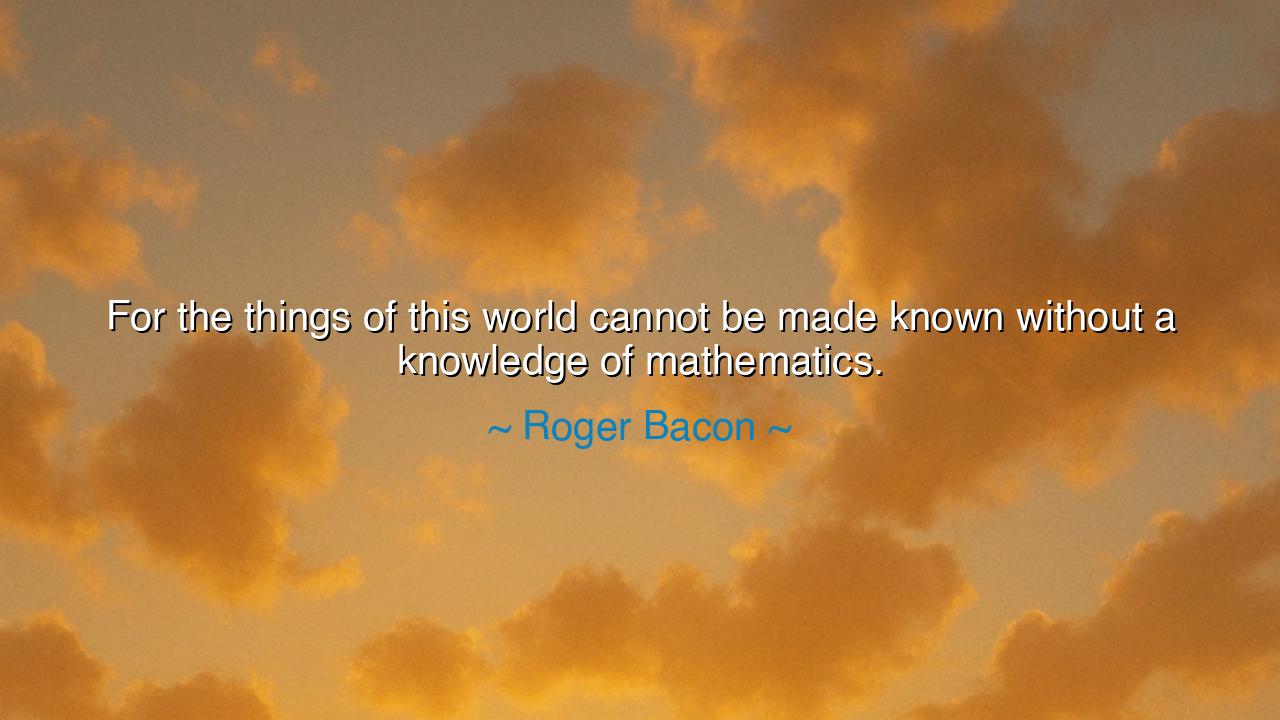
For the things of this world cannot be made known without a






The words of Roger Bacon, a friar and scholar of the thirteenth century, resound like a timeless decree: “For the things of this world cannot be made known without a knowledge of mathematics.” In this truth, he unveils the key that unlocks the universe. Mathematics is not merely a science of numbers, but the language by which the cosmos speaks. It is the pattern hidden within the stars, the rhythm that beats within the heart, the proportion that gives beauty to art and strength to architecture. Without it, man stumbles in darkness; with it, the world begins to reveal its secrets.
Bacon lived in an age when faith and reason often clashed, yet he was bold enough to proclaim that mathematics is essential to knowledge itself. For while theology may guide the soul, and philosophy may question the mind, mathematics anchors thought in certainty. Where words may deceive and opinions may quarrel, numbers stand immutable, eternal, beyond dispute. To measure, to weigh, to calculate—this is to move from confusion to clarity. Thus Bacon, centuries before the scientific revolution, foresaw that the path of discovery would be paved with numbers.
Consider the story of Galileo Galilei, who centuries later confirmed Bacon’s vision. When Galileo turned his telescope toward the heavens, he did not merely gaze in wonder—he measured the movement of moons, calculated their paths, and expressed the music of the cosmos in mathematical law. Without mathematics, the stars would remain mysteries. With mathematics, they became knowable, their order revealed as though written by the divine hand. Galileo declared that the book of nature is written in the language of mathematics, echoing Bacon’s ancient wisdom.
Nor is this truth confined to the heavens. The builders of the Egyptian pyramids employed mathematics to raise stones of unimaginable weight into eternal harmony. The architects of Gothic cathedrals carved their glory by measuring proportions of length, height, and light. Even the farmer, casting seeds into the soil, depends on cycles measured in days, seasons, and years—mathematics hidden in the very turning of the earth. Everywhere, the world whispers in numbers, and those who listen with understanding can harness its power.
Yet Bacon’s warning carries deeper meaning: without mathematics, knowledge remains half-blind. To study medicine without numbers is to guess at the pulse. To study trade without calculation is to invite ruin. To study the earth without measurement is to misread its story. Knowledge divorced from mathematics drifts like a ship without compass or stars. Bacon, though bound by the medieval world, saw the eternal truth: that no discipline, no science, no understanding can reach its fullness without this foundation.
The lesson for us, therefore, is both humbling and urgent: embrace mathematics not as a burden, but as a gateway. Do not say, “This is for others, not for me,” for to turn away from numbers is to turn away from the deepest structure of reality. Instead, cultivate curiosity—measure the world around you, seek patterns in nature, and marvel at the order hidden in chaos. By doing so, you walk in the footsteps of sages and scientists, joining the lineage of those who sought to understand creation itself.
Practical wisdom flows from this truth. If you are a student, do not neglect your study of numbers, for they will guide you long after lessons are forgotten. If you are a teacher, kindle in others not fear but wonder at mathematics, showing that it is the language of stars, rivers, music, and life. If you are a seeker, let numbers teach you humility, for they remind us that truth is not born of opinion, but discovered in order eternal.
Thus, O listener, remember Roger Bacon’s words: the things of this world cannot be known without mathematics. To despise numbers is to despise understanding itself. But to honor them is to take up the key to creation, to step through the hidden doors of knowledge, and to glimpse the wisdom with which the universe was woven. For in the eternal harmony of mathematics, we do not merely count—we learn to see.






AAdministratorAdministrator
Welcome, honored guests. Please leave a comment, we will respond soon